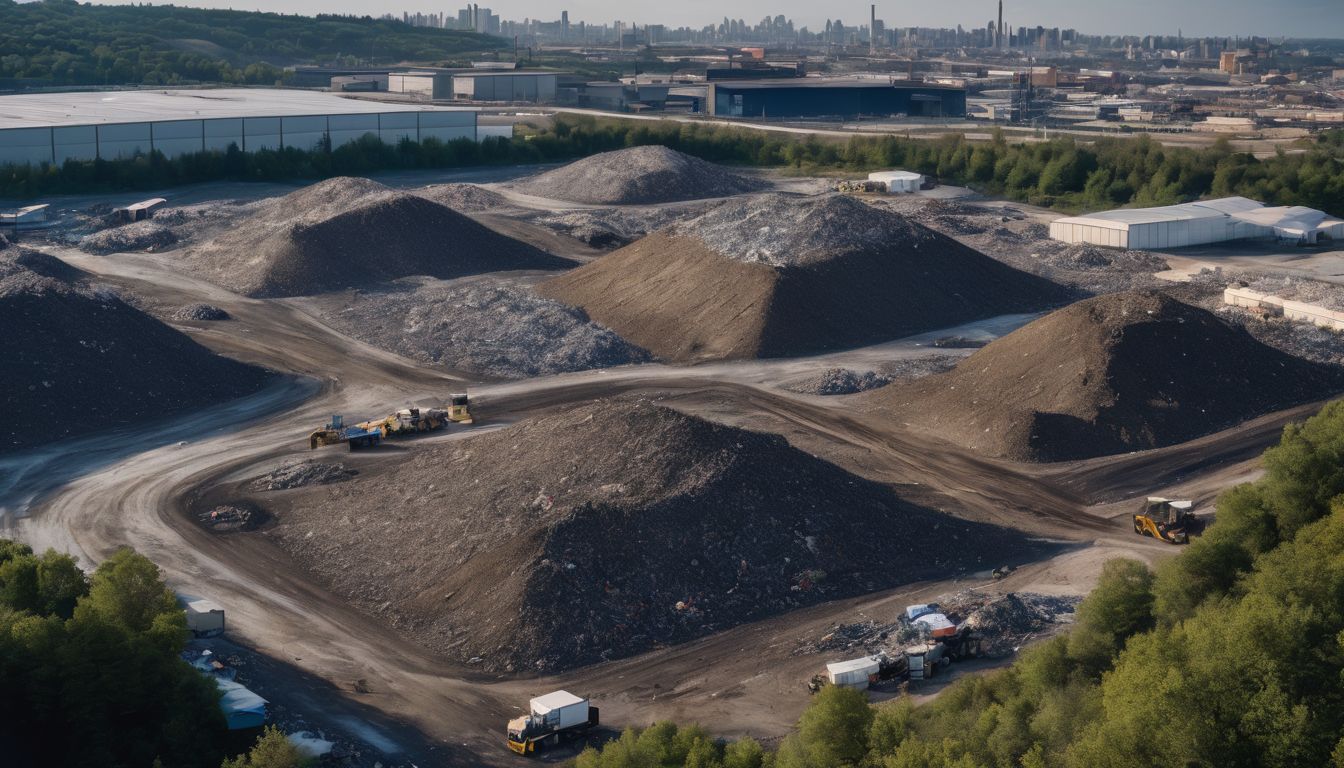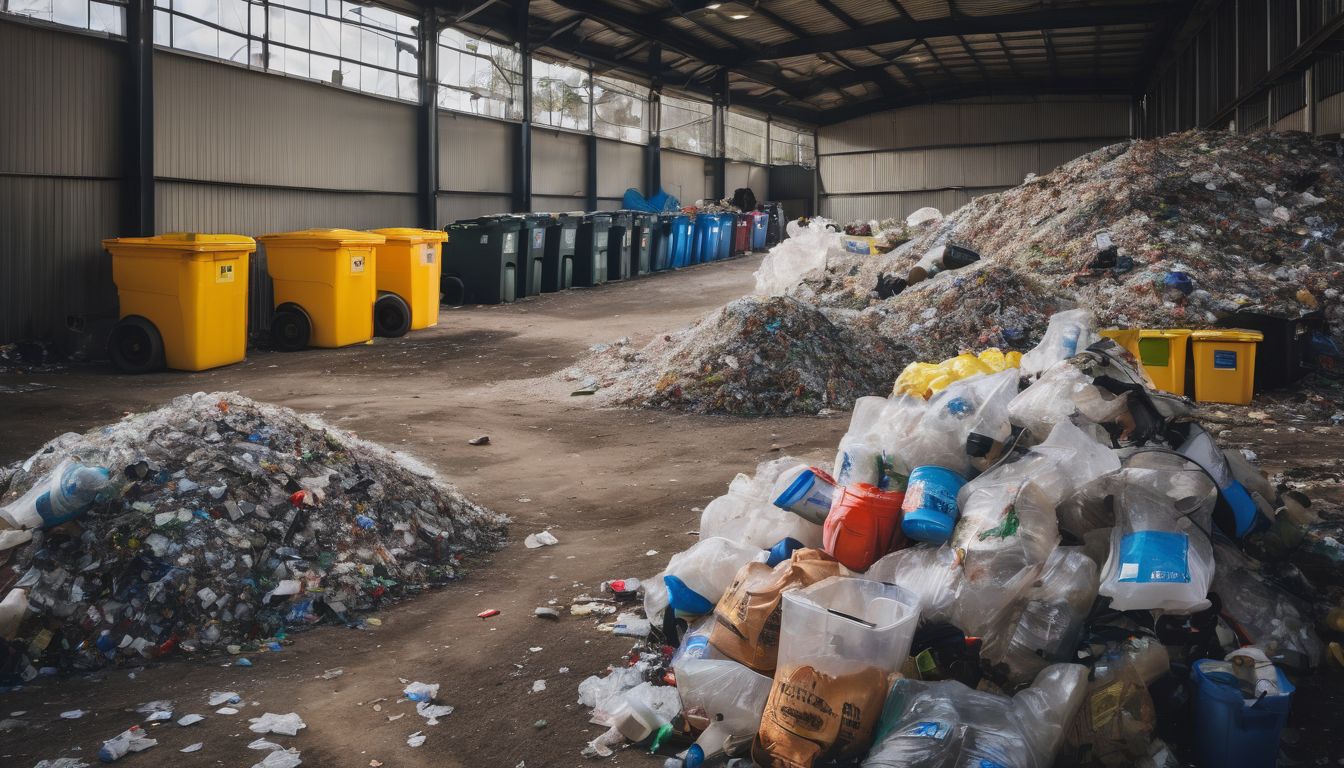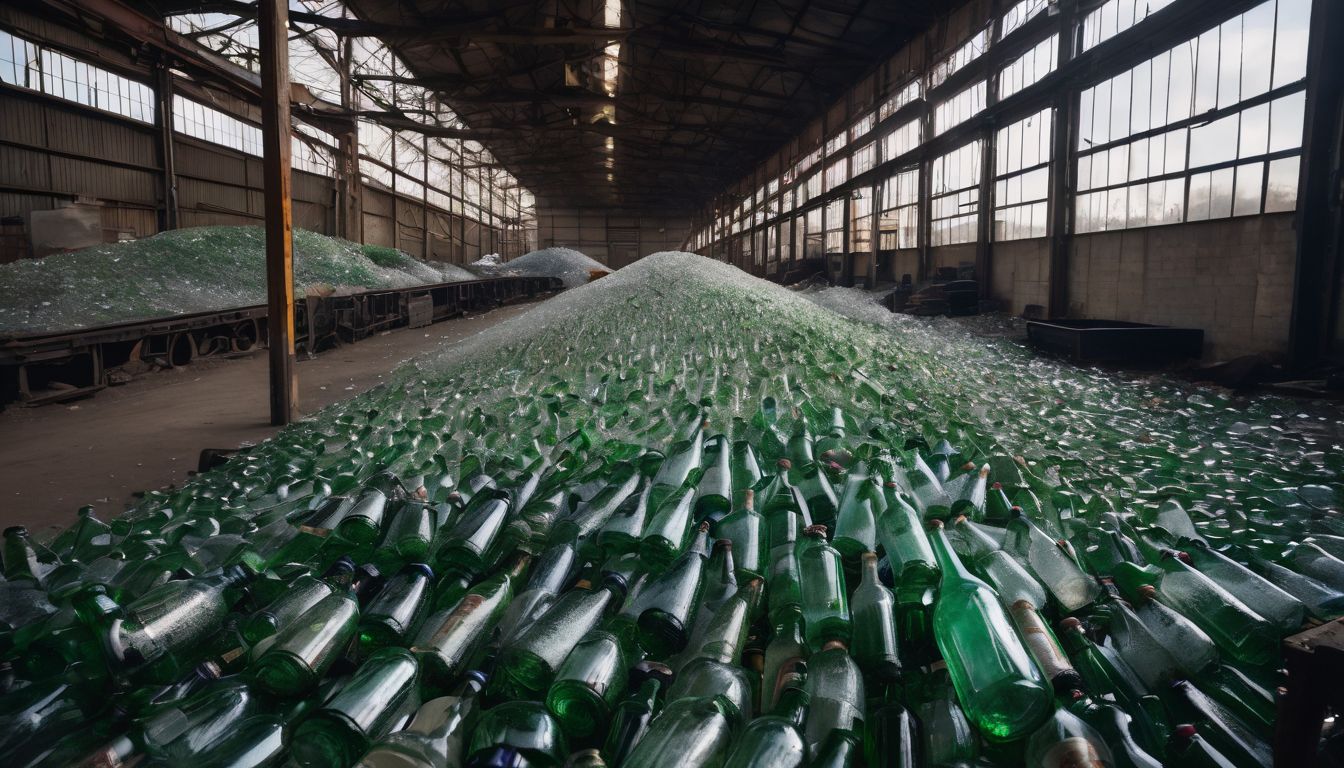As the world grapples with the growing problem of waste management, many of us are seeking better ways to reduce our environmental footprint. One inspiring fact is that several countries have made huge strides in innovative recycling and upcycling projects.
This article will explore groundbreaking initiatives from across the globe that are transforming trash into treasures, offering you a wealth of ideas for eco-friendly living. Discover how rubbish becomes resourceful – keep reading!
Key Takeaways
- Sweden is a leader in recycling, with nearly half of its waste turned into energy for heating and electricity. They’ve set an example by importing rubbish to fuel their advanced waste-to-energy programmes.
- Japan has mastered the art of segregation, ensuring that recyclable materials like plastics, paper, and glass are efficiently sorted to prevent landfill overload. Their meticulous system supports a circular economy focused on conservation.
- San Francisco takes organic waste seriously by enforcing mandatory composting, helping to reduce greenhouse gas emissions and nurture local agriculture with nutrient-rich soil from recycled food scraps and garden trimmings.
- In Barcelona, used cooking oil gets a second life as biodiesel through recycling initiatives that encourage residents to deposit it at collection points instead of polluting the environment.
- Through innovative solutions such as reverse vending machines in the USA and artistic upcycling projects in Argentina, global efforts are being made to make recycling both rewarding for citizens and beneficial for the planet.
Exploring Recycling Initiatives Around the Globe
In Sweden, waste-to-energy initiatives have revolutionised the way waste is managed, providing sustainable fuel sources. Japan has implemented optimal segregation practices to maximise recycling and reduce landfill waste.
In Switzerland, active policies and education programmes have led to significant reductions in waste production. South Korea’s innovative approach focuses on tackling food waste through various solutions, while Wales has taken a proactive stance with its recycling policies and educational efforts.
Sweden: Waste-to-Energy
Sweden leads the charge in innovative recycling projects, turning household waste into energy at an impressive scale. Nearly half of Swedish garbage gets converted into power and heat for cities through their advanced waste-to-energy programs.
This bold initiative showcases ecofriendly solutions by reducing landfill use and harnessing renewable resources.
Their commitment to environmental conservation is evident as they import rubbish from other countries to keep their plants running efficiently. Swedish towns enjoy a cleaner atmosphere thanks to this sustainable waste management strategy, demonstrating that trash can indeed be treasure when repurposed through green technology innovations.
Japan: Optimal Segregation
Japan excels in optimal segregation through its rigorous waste management system. Citizens actively participate in the meticulous sorting of their waste into categories such as plastic, paper, glass, and organic materials.
This commitment ensures efficient recycling processes and minimises landfill waste. Japan’s innovative approach to recycling aligns with their circular economy initiatives and resource conservation projects, marking them as leaders in eco-friendly recycling solutions.
The country’s waste reduction strategies are significant contributors to global environmental sustainability efforts. With Japan leading the way, other countries could adopt similar forward-thinking environmental practices that prioritise responsible resource recovery innovations and circular economy practices.
Switzerland: Waste Reduction
In Switzerland, waste reduction is not just a concept; it’s a way of life. The country has implemented innovative initiatives to minimise waste generation, focusing on eco-friendly recycling solutions and resource conservation projects.
From mandatory composting to active policies promoting environmental sustainability efforts, Switzerland is setting an example for forward-thinking environmental practices worldwide.
Innovative repurposing ideas are also prevalent in Switzerland, where creative upcycling initiatives are encouraged for sustainable waste management. Green technology advancements play a significant role in the country’s environmental conservation efforts, paving the way for eco-friendly recycling initiatives and repurposing materials projects that resonate with environmentally conscious individuals supporting conservation and environmental sustainability.
South Korea: Tackling Food Waste
South Korea is addressing food waste head-on by implementing a pay-as-you-throw system for food scraps. This initiative encourages citizens to reduce waste and recycle more efficiently, resulting in a significant decrease in the amount of food being sent to landfills.
Additionally, South Korea has also taken steps to divert discarded food from homes and businesses towards animal feed or bioenergy production, contributing to resource conservation and environmental sustainability efforts.
Wales: Active Policies and Education
Wales implements active policies and education to promote environmental sustainability. The government encourages recycling through comprehensive educational programmes, engaging citizens at all levels.
Schools incorporate eco-friendly initiatives into their curriculum, teaching young generations the importance of resource conservation and waste management.
Through constant innovation and forward-thinking strategies, Wales strives to set an example for sustainable waste management worldwide. By focusing on active policies and education, Wales aims to create a greener future for generations to come.
Innovative Reuse Projects
Cooking Oil Recycling in Barcelona involves the collection of used cooking oil and its conversion into biodiesel, reducing waste and promoting sustainable energy. Mandatory Composting in San Francisco requires residents to separate food scraps and yard trimmings for composting, contributing to a reduction in landfill waste.
Stylised Trash in Argentina sees artists using recycled materials to create art installations, turning waste into creative expressions that raise awareness about environmental issues.
Cooking Oil Recycling in Barcelona
Barcelona has embraced an eco-friendly approach by implementing a system for recycling cooking oil. Residents are encouraged to deposit used cooking oil in collection points across the city.
This initiative not only reduces environmental pollution but also enables the transformation of waste into biofuel and other useful products, promoting resource conservation and environmental sustainability.
Through this innovative project, Barcelona is demonstrating its commitment to sustainable waste management and inspiring individuals worldwide to consider creative upcycling solutions.
The city’s forward-thinking environmental practices serve as a model for other urban areas aiming to enhance their eco-conscious sustainability projects.
Mandatory Composting in San Francisco
San Francisco requires all residents and businesses to separate their food scraps, yard trimmings, and soiled paper from the regular trash. This mandatory composting regulation has significantly reduced the amount of waste sent to landfills.
The city provides green bins for organic waste collection and offers educational programs to encourage proper sorting.
Through this initiative, San Francisco aims to divert organic materials away from landfills and reduce greenhouse gas emissions. Mandatory composting not only supports environmental sustainability but also contributes to a more circular economy by turning organic waste into nutrient-rich compost for local agriculture.
Stylised Trash in Argentina
In Argentina, innovative recycling initiatives are turning rubbish into art. Street artists collaborate with communities, transforming public spaces and discarded materials into vibrant installations.
By creating visual impact, these projects raise awareness about waste reduction and environmental sustainability. These stylised rubbish artworks not only beautify the urban landscape but also inspire citizens to rethink their consumption and disposal habits.
Moving on to the next section – “Recycling Becomes Illuminating in Warsaw”..
Recycling Becomes Illuminating in Warsaw
In Warsaw, a creative approach to recycling has illuminated the city with eco-friendly art installations made from reclaimed materials. Artists and environmentalists have come together to transform discarded items into stunning sculptures, bringing attention to the importance of sustainability in a visually striking way.
These innovative projects not only beautify public spaces but also serve as powerful reminders of the impact of waste on the environment.
Eco-conscious citizens can now witness firsthand how repurposing materials can create something beautiful and impactful. The initiative aims to inspire individuals to rethink their consumption habits while appreciating the transformative potential of recycling.
Reverse Vending Pays Recyclers in the USA
Reverse vending machines are an innovative recycling solution that incentivises individuals to recycle their beverage containers in the USA. These machines accept empty bottles and cans, providing a monetary reward or a discount towards future purchases.
This initiative encourages active participation in waste reduction efforts while promoting environmental sustainability.
Recycling initiatives like reverse vending contribute to resource conservation, reduce landfill waste, and promote a circular economy by giving a second life to recyclable materials.
Encouraging proactive involvement from the public is essential for fostering eco-conscious practices and supporting environmental sustainability on a larger scale. The implementation of such forward-thinking projects is crucial for driving positive change towards greener living.
Waste-Water Park in Germany
Germany’s forward-thinking environmental efforts have led to the creation of a unique and innovative project – the Waste-Water Park. This initiative combines sustainability with public recreation, as it involves the transformation of wastewater treatment plants into scenic parks.
By repurposing these facilities, Germany demonstrates its commitment to resource conservation and eco-friendly recycling solutions, turning previously industrial areas into green spaces that benefit both the environment and local communities.
The Waste-Water Park in Germany not only promotes environmental sustainability but also fosters greater awareness about waste management practices among citizens. Through this innovative reuse project, Germany sets an example for other countries by integrating resource conservation projects with community well-being, thus fostering a more eco-friendly and sustainable future.
The Connection Between Climate Change and Waste Management
The connection between climate change and waste management is crucial for a sustainable future. Active policies, citizen awareness, and the role of technology all play a significant role in shaping the way we manage our waste to combat climate change.
The Role of Technology
Technology plays a crucial role in revolutionising recycling and waste management. Advanced sorting machines, such as optical scanners and AI-powered systems, enhance the efficiency of material separation at recycling facilities.
These technologies enable the identification and sorting of various types of recyclable materials with precision and speed, contributing to higher rates of waste diversion from landfills.
Additionally, innovative apps and platforms empower individuals to participate actively in recycling efforts by providing information on local recycling options, collection schedules, and drop-off locations.
Citizen Awareness
Citizen awareness plays a crucial role in the success of recycling initiatives. By understanding the environmental impact of waste and the benefits of recycling, individuals can actively contribute to eco-friendly solutions.
Encouraging education and participation helps foster a culture of sustainability within communities, ultimately leading to more successful environmental conservation efforts.
Empowering citizens with knowledge about innovative recycling projects, waste reduction techniques, and sustainable waste management practices fosters an environmentally conscious society.
Active Policies
Countries worldwide are implementing active policies to promote environmental sustainability and reduce waste. These include measures such as mandatory recycling programmes, waste reduction targets, and incentives for businesses that adopt eco-friendly practices.
Governments are also working on legislation to ban single-use plastics and promote the use of sustainable materials in packaging. By enforcing these measures, they aim to encourage responsible consumer behaviour and minimise the impact of waste on the environment, supporting conservation efforts globally.
The Future of Recycling
The future of recycling will focus on tackling the plastic “end-of-life” challenge and implementing zero-waste projects, as well as finding innovative ways to reuse materials. To learn more about these exciting developments in environmental sustainability, keep reading!
Plastic “End-of-Life” Challenge
Plastic pollution poses a significant challenge to environmental sustainability. Innovative solutions are being developed worldwide to address the plastic “end-of-life” problem, ensuring that plastics do not end up in landfills or oceans.
Initiatives such as advanced recycling technologies and biodegradable alternatives offer promising ways to reduce plastic waste.
Countries across the globe are implementing active policies and encouraging citizen awareness to tackle the issue of plastic waste. Additionally, forward-thinking companies are exploring eco-friendly recycling initiatives, such as innovative repurposing ideas and sustainable waste management initiatives aimed at reducing plastic’s impact on the environment.
Zero-Waste Projects
Zero-waste projects aim to minimise waste by re-evaluating consumption and production processes. Innovative strategies include reducing packaging, promoting reusable products, and implementing composting systems.
These efforts help communities divert waste from landfills, leading to significant environmental benefits.
Innovative zero-waste initiatives around the world showcase how communities can embrace sustainable practices to minimize their environmental impact. From bulk stores offering package-free shopping experiences to cities implementing robust recycling programmes, these projects illustrate the potential for a greener future through conscious waste reduction measures.
Innovative Ways to Reuse Materials
Innovative ways to reuse materials offer new possibilities for environmental sustainability. Creative initiatives such as upcycling, where discarded items are repurposed into new products, contribute to waste reduction efforts.
Finding innovative uses for materials extends their lifespan, reducing the demand for virgin resources and lessening the impact on the environment.
Engaging in innovative reuse projects promotes a circular economy and supports ecological conservation. By incorporating eco-friendly recycling solutions into everyday practices, individuals actively contribute to forward-thinking environmental practices while being part of green recycling innovations that benefit society as a whole.
Conclusion
Innovative recycling projects around the world have made significant strides in waste reduction and environmental sustainability. These eco-friendly initiatives showcase forward-thinking environmental practices and solutions.
From waste-to-energy in Sweden to mandatory composting in San Francisco, these efforts demonstrate the impact of active policies and education on citizen awareness. The future of recycling looks promising with zero-waste projects and innovative ways to reuse materials gaining momentum globally.
FAQs
1. What are innovative recycling projects?
Innovative recycling projects are eco-friendly initiatives that use creative and sustainable methods to reduce waste and promote environmental innovation.
2. How do these projects help the environment?
These environmentally friendly recycling solutions tackle waste by turning it into new products, helping to drive forward-thinking environmental practices for sustainability.
3. Can you give examples of some innovative waste reduction projects around the world?
Examples include eco-conscious sustainability projects where communities turn plastic bottles into building materials and cities implement cutting-edge systems to recycle household items more effectively.
4. Why are eco-friendly recycling initiatives important?
Eco-friendly recycling initiatives play a vital role in preserving our planet by reducing pollution, conserving resources, and supporting overall efforts toward environmental sustainability.





